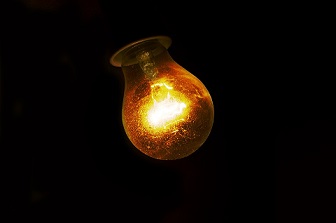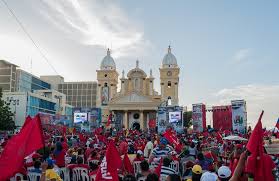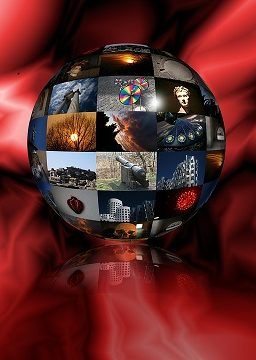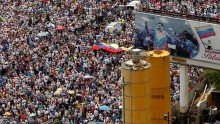Venezuela.- In the twenty-first century, when communications technology is found in the outer reaches of the globe, large media powers contrive to shield the majority of people from reality, in this case, from what is happening in Venezuela.
As an example, large media outlets say that president Nicolás Maduro led a coup d’etat, or launched a self-inflicted coup.
According to analysts, the coup in Venezuela was
not led by Maduro, but rather the National Assembly had been carrying out the coup since it was sworn in on 5 January 2016, when its president, Henry Ramos Allup, confirmed that he would remove the governor from government in six months.
Recently, the Venezuelan economist and academic Pasqualina Curcio discussed the current situation in the Latin American state in a very unusual way: looking at things in reverse.
Here are a few of her 22 aspects of reality, seen in reverse:
Between 1958 and 1998, in the space of 40 years, 24 electoral procedures took place – an average of one election every 2 years. After 1999, in the space of 18 years, there were 25 elections, including recall and constitutional referendums, on average almost two annual elections.
 There have been 3 elections over the past 4 years, since 2013. According to political players currently opposing the national government, since 1999, Venezuelans have been subjected to an increasingly tyrannical dictatorship, especially after 2013.
There have been 3 elections over the past 4 years, since 2013. According to political players currently opposing the national government, since 1999, Venezuelans have been subjected to an increasingly tyrannical dictatorship, especially after 2013.
Of the more than a thousand radio and television broadcasters that the government has granted permission to operate on the radiomagnetic spectrum, 67% are private, 28% are controlled by communities and 5% are run by the state.
Of the 108 daily newspapers in print, 97 are private and 11 are public. Internet access is available to 67% of the Venezuelan population. According to political players that oppose the government, freedom of expression does not exist in Venezuela.
Fully exercising his functions within his six-year presidential term and faced with violent acts from local opponents who wish for economic, social and political destabilisation, the president of the Republic has called on the opposition to participate in a dialogue towards peace.
The opposition is not taking him up on the invitation; it prefers to promote violence on the streets. The president is a tyrant and dictator and the opposition are the real democrats.

All political organisations (parties) are undergoing a regenerative process, a call made by one of the five public authorities, the National Electoral Council.
Everyone has answered the call for regeneration. Regional and municipal elections are a fact. Meanwhile, leaders and followers of local opposition players bellow, “We are in a dictatorship!”
Human rights are being violated in Venezuela; the Inter-American Democratic Charter must be applied. The above was declared in Washington by Luis Almagro, general secretary of the Organisation of American States.
Meanwhile in Ginebra, the United Nations overwhelmingly approved the Universal Periodic Review presented by Venezuela. The exam has as its aim to monitor the human rights situation in each of the 193 United Nations member states.
The extreme right, which is the opposition to the national government, finances and promotes violent and terrorist acts: it implements road blocks on streets, avenues and principal arteries; it jeopardises schools and health providers; in a fascist, terrorist and insane act, it used mercenaries to besiege and set alight the ‘Hugo Chávez Frías’ Maternal and Infants Hospital in the El Valle district, in which 58 newborns and women in labour who were suffocated by the smoke had to be evacuated.
 According to the opposition, the responsibility lies with the national government to control the situation, disperse mercenaries and evacuate women and children.
According to the opposition, the responsibility lies with the national government to control the situation, disperse mercenaries and evacuate women and children.
There are food, medicine and hygiene product shortages. Companies producing, importing and distributing such goods (large multinationals) have received prime-rate foreign currency; they have received subsidised raw materials, and yet they have increased product prices by almost 4000% in less than a year (2016).
Venezuelan people join long queues to get their hands on those products. Shelves remain empty. This is not due to the inefficiency of private companies, rather failure of the socialist model in Venezuela.
Despite its price increasing by 3700% (moving from 19 bolivars in March 2016 to 700 bolivars in December), far greater than annual inflation, hundreds of consumers form long queues to buy pre-cooked maize flour to make arepas (the bread of Venezuelans).
After seeing customers forming long queues to buy their brand, business owners responded by lowering flour production by 80%.
On radio opinion programmes you mostly hear people with an editorial line that is strongly against the national government, “we are in the worst ever economic crisis, we need humanitarian aid, we are dying of hunger, there is no food, we demand for humanitarian corridors to be opened”.
 Then you hear, “And now a message from our sponsors…come to Restaurant X, where you can sample a variety of meat and fish, exquisite desserts, located on whatever street; bring all the family this weekend”…
Then you hear, “And now a message from our sponsors…come to Restaurant X, where you can sample a variety of meat and fish, exquisite desserts, located on whatever street; bring all the family this weekend”…
“Dear friends, are you going away at Easter? Don’t forget to go to supermarket X, where you can find everything you need: variety and freshness at low prices in order to enjoy wonderful holidays and have a well-deserved rest”.
Back to the programme, “We return with today’s guest, an expert on the economy. We will continue to discuss the importance of opening a humanitarian corridor in Venezuela due to food shortages”.
The leading Venezuelan company, Petróleos de Venezuela, provides 95% of the country’s hard currency; the other 4% comes from other state businesses. Private companies provide the remaining 1%. In Venezuela, private companies are efficient and successful; those of the state are inefficient.
National production per capita over the past fours years in Venezuela is, on average, 9% higher than production over the last 30 years. Unemployment rates over the past 30 years are at an all time low, at 6.6%. Venezuela is in its worst ever crisis and amidst economic chaos.
 The main pharmaceutical factories that import, produce and distribute more than 90% of medicines and surgical equipment in Venezuela received 1.660 billion dollars from the government at a preferential rate in 2008 to import goods.
The main pharmaceutical factories that import, produce and distribute more than 90% of medicines and surgical equipment in Venezuela received 1.660 billion dollars from the government at a preferential rate in 2008 to import goods.
In 2015, they received 1.789 billion (more than in 2008). In 2008 there was no shortage in medicines, in 2015 there was. The government is responsible for the shortage in medicines.
The Republic paid more than 60 billion dollars in external debt commitments over the last four years. The task was carried out in full and punctually.
Venezuela is assessed as the country with the highest rate of financial risk in the world.
Perhaps the Venezuelan state is so risky because it houses the world’s main reserves of oil, and its second largest reserves of gas, fresh water, coltan, diamonds, gold and other resources, which must be a high-risk status for many banks.
In April 2002, the coup perpetrators that disbanded all public powers through a decree that constitutes the biggest affront to the National Constitution, emotionally shouted, “Freedom and democracy.”
According to Curcio’s reversal, those who shouted “Freedom and democracy” that day at the Salón Ayacucho in the Palacio de Miraflores, today approve the supposed departure of the president of the Republic. They are those who chant “Down with the dictator”, referring to the constitutionally elected president, who won with a majority vote from the Venezuelan population. In the eyes of some, she underlines, those are the democrats. (PL)
Strange Fruit: Venezuela has an Opposition that Nobody Should Support












